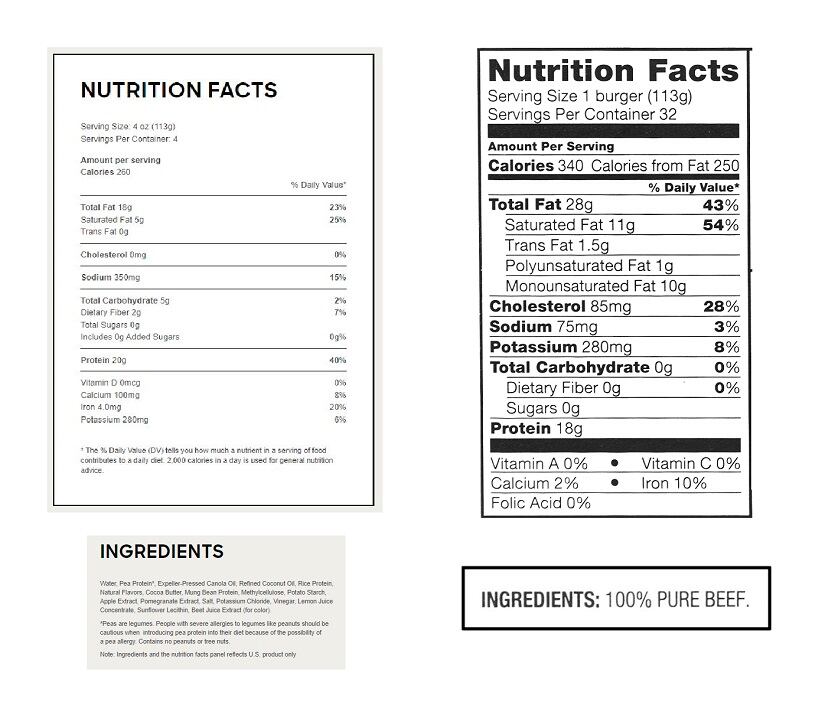The SWAP-MEAT (The Study With Appetizing Plantfood—Meat Eating Alternatives Trial), published in the American Journal of Clinical Nutrition, was conducted as a single-site, randomized crossover trial with no washout period. 36 participants (67% women, 69% Caucasian) received plant and animal products, dietary counseling, lab assessments, microbiome assessments, and anthropometric measurements.
The study was funded by an unrestricted gift from Beyond Meat and used products from the company in comparing the health effects of animal meat with plant-based meat. Beyond Meat was not involved in designing or conducting the study and did not participate in data analysis.
Addressing the health backlash vs plant-based alternatives
While plant-based protein has seen strong consumer adoption from people looking to minimize their meat intake (for health or environmental reasons), some brands in the space have come under fire over the use of ingredients such as coconut oil (high in saturated fat) and their 'highly processed' credentials.
"There's been this sort of backlash against these new meat alternatives," said lead researcher, Christopher Gardner, PhD, professor of medicine at the Stanford Prevention Research Center.
"The question is, if you're adding sodium and coconut oil, which is high in saturated fat, and using processed ingredients, is the product still actually healthy?"
To find out, study participants were split into two groups with one cohort instructed to consume at least two servings a day of plant-based protein (i.e. a variety of Beyond Meat products) and the other group told to eat two servings per day of animal protein (primarily red meat and sometimes chicken) for eight weeks while keeping all other foods and beverages as similar as possible between the two phases. Then the two groups switched diets.
"Whereas the plant-meat and animal-meat products were provided, the remainder of the diet was self-selected, thus limiting the ability to control the intake of other foods and nutrients," acknowledged the authors. "Although this limited the rigor of dietary control, it increased the generalizability of the findings."
Beyond Meat Burger vs. 100% Beef Burger Nutrition

‘Not all highly processed foods are created equal’
The effect consuming plant-based meat alternatives for eight weeks straight had on participants is statistically and clinically significant, said Gardner.
Researchers found that participants' levels of LDL cholesterol dropped, on average, 10 milligrams per deciliter after consuming plant-based products for eight weeks. In addition, participants lost an average of 2 lbs during the plant-based portion of the diet.
"The modest weight loss observed when participants substituted the plant-based meats in place of the red meats is an unexpected finding, since this was not a weight-loss study," added lead author of the study, Anthony Crimarco, PhD.
"I think this indicates the importance of diet quality. Not all highly processed foods are created equal," noted Crimarco.
Another notable indicator of the health impact replacing animal with plant-based alternatives can have was participants levels of fasting serum TMAO (trimethylamine N-oxide), a molecule linked to cardiovascular disease risk. One study found that people with elevated TMAO had a 60% higher risk of adverse cardiovascular events such as a heart attack.
According to the study findings, TMAO levels were lower when study participants were eating plant-based meat.
“At this point we cannot be sure that TMAO is a causal risk factor or just an association," Gardner said, but noted that TMAO is an emerging risk factor health area to pay attention to in future related health studies.
Authors: Anthony Crimarco, Sparkle Springfield Christina Petlura, Taylor Streaty, Kristen Cunanan, Justin Lee, Priya Fielding-Singh, Matthew M Carter, Madeline A Topf, Hannah C Wastyk, Erica D Sonnenburg, Justin L Sonnenburg, and Christopher D Gardner

